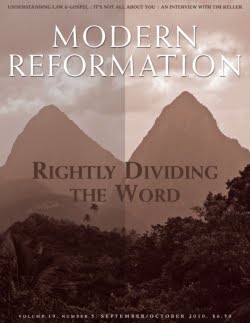
The latest issue of Modern Reformation contains articles from not one but three Mockingbird Contributors: Jady Koch, Nick Lannon and Sean Norris. Well done, guys! If you’re not a subscriber, do yourself a favor – ModRef is one of the best theological magazines going. It manages to be accessible to the non-academic and engaged in the real issues facing “people in the pews,” without sacrificing one iota of intellectual firepower – all delivered with a healthy dose of stridency and self-effacing humor. If the Protestant Reformation is even remotely a concern for you (as it is for us!), then Modern Reformation is for you. Plug over.
Sean Norris’ article “An Introduction to the Law and the Gospel” is available online in its entirety, and it is indispensable. We talk a lot on here about “The Law” and “The Gospel,” about the importance of dividing them in preaching or reading the Bible; in fact, these concepts lurk behind much of our output. Well, if you’ve ever wondered what we mean, or just want a refresher, run don’t walk. A few paragraphs from the intro and the conclusion each to whet your appetite:
The distinction between the law and the gospel is a completely foreign concept to many Christians and one that eluded me for many years. Before I heard Christianity presented in these terms, the standard framework by which I understood Christianity was couched in relational language. The foundation of religion was expressed something like: “I want to get to know Jesus more,” or, “It’s all about a relationship with the Lord.” The result of such a framework was a rather ambiguous understanding of the faith. If I was honest with myself, I only kind of knew what I believed, and I sort of knew why I believed it. My faith was dependent on my experience and emotions, which meant that I really had to work hard to keep the experience going. It was important to feel close to the Lord at all times because that was the primary indicator of a good relationship with him.
What did that look like? The usual: experiencing an intimate time of worship (warm fuzzy feelings or being brought to tears), a regular quiet time (reading the Bible), journaling, and so on. This outward show also extended to abstaining from the usual vices: swearing, gossiping, making fun of people, envying, lusting, and on, and on, and on. This was a depressing and scary way to live because I was never successful. The core of my entire belief system and worldview was built upon the sandy shore of my ability.
What are the law and the gospel? They are not abstract theological categories made up by people in their studies many years ago with way too much time on their hands. The law and the gospel are God’s two words spoken to us in his Bible; they are its two main subcategories, if you will. As such, they constitute more than simply one of many possible frameworks for reading and understanding the Bible; they are the foundational framework. Understanding them and the distinction between them is key to understanding the whole of God’s Word and the whole of the Christian religion. As Martin Luther wrote, “Virtually the whole of the scriptures and the understanding of the whole of theology depends upon the true understanding of the law and the gospel.”
—————
What are the implications of this distinction between law and gospel for our understanding of the Bible? Considering both the law and gospel kills the notion that the Bible is a manual for living–a view commonly held today. If the Bible were such a manual, Christianity would be all about what we do. Instead, the Bible is God’s active Word in our lives. From it comes the law, “Be perfect as your heavenly Father is perfect,” crushing any notion of self-justification by our good works and revealing our sinful state. With the law is the gospel–the freeing message that Jesus Christ died for our sins and was raised for our justification (Rom. 4:25). The two words tell us that Christianity is all about what he has done! The Bible is the proclamation of the truth–the truth about us and about God. It is nothing short of revelation, and this truth sets us free indeed.
What are the implications of these two inseparable words for our everyday lives? As mentioned above, our relationship with God does not depend on us; rather, it rests solely on the completed work of Jesus Christ at the cross. When we understand this about our relationship, the result is that we can rest. We can finally have peace. Our efforts to preserve a relationship with God can stop. Our motivations for our study of the Bible, prayer, and worship can come not out of fear of punishment or separation from God but out of the joy of security in God’s faithfulness to us shown in his Son, Jesus, so that we are inspired to grateful living. Whenever we feel the accusation of the law, we can recognize its purpose, which is to drive us back to the cross where we hear the gospel again.
For I am sure that neither death nor life, nor angels nor rulers, nor things present nor things to come, nor powers, nor height nor depth, nor anything in all creation, will be able to separate us from the love of God in Christ Jesus our Lord. (Rom. 8:38-39)

COMMENTS
One response to “An Introduction to the Law and the Gospel – Sean Norris in Modern Reformation”
Leave a Reply















And, if I may, here is the best book ever written on the subject of Law and Gospel:
http://www.cph.org/p-8987-law-and-gospel-how-to-read-and-apply-the-bible.aspx